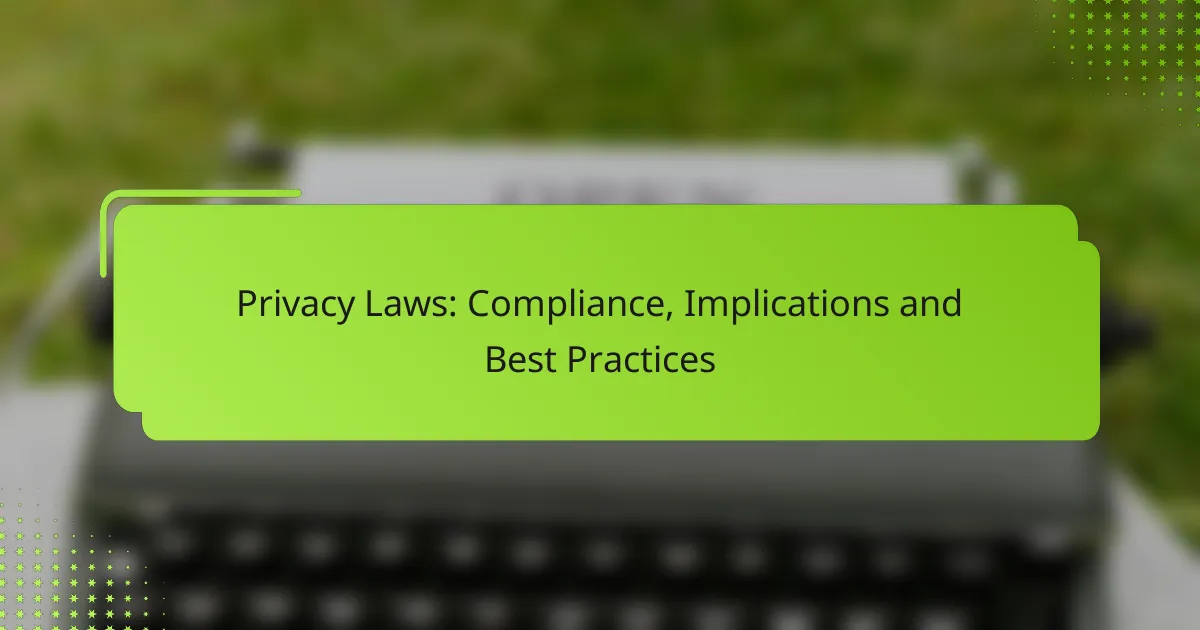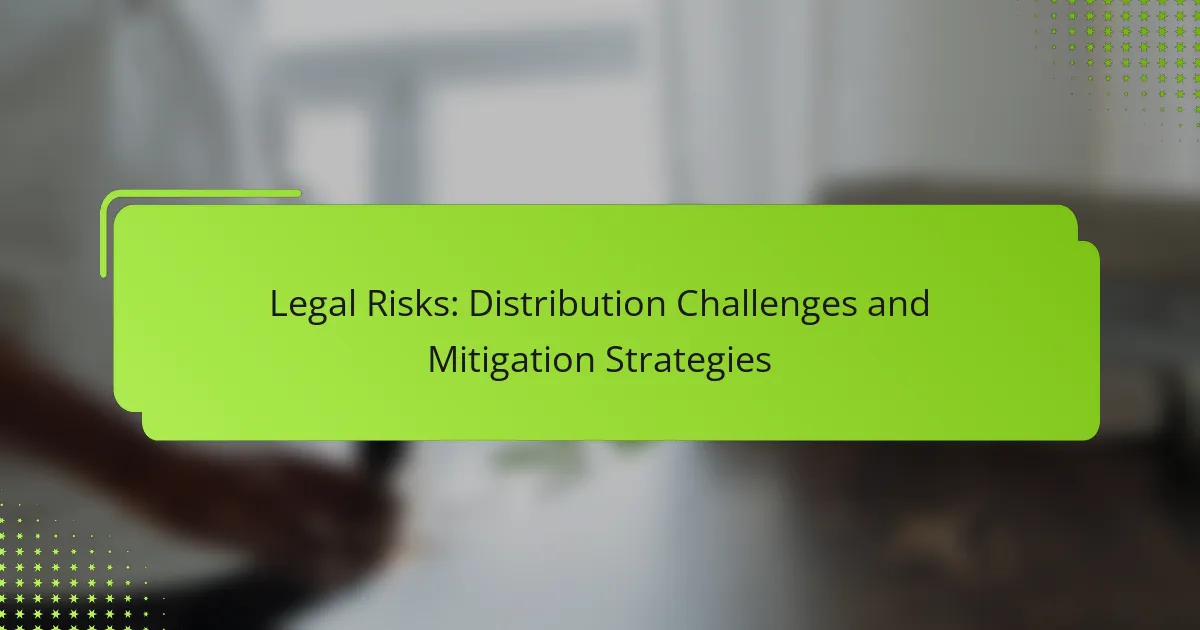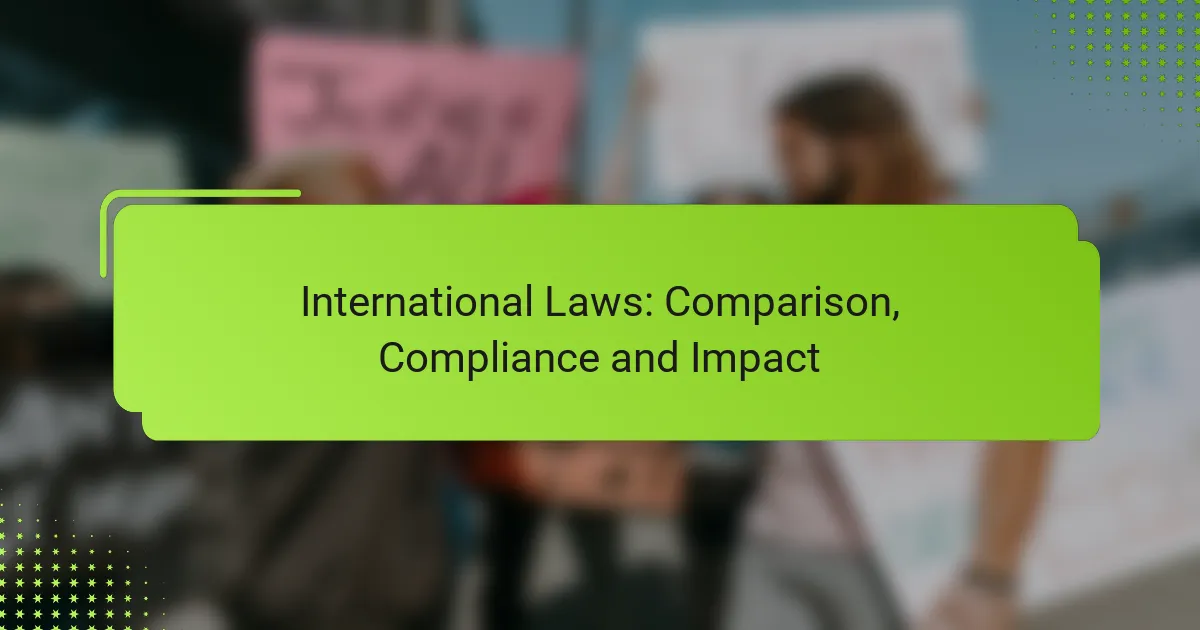In today’s digital landscape, understanding privacy laws is essential for businesses to ensure compliance and mitigate risks. These regulations vary significantly and carry serious implications for non-compliance, including financial penalties and reputational damage. By adopting best practices and implementing systematic processes, organizations can navigate the complexities of privacy laws effectively.
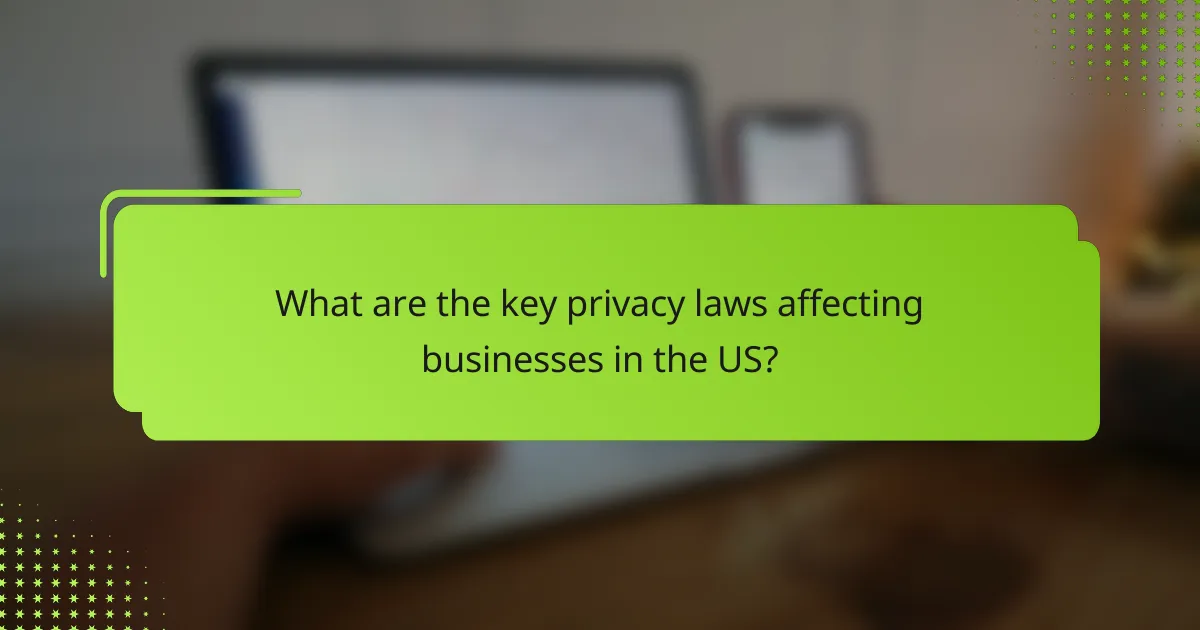
What are the key privacy laws affecting businesses in the US?
Several key privacy laws significantly impact businesses in the US, each with unique requirements and implications. Understanding these regulations is crucial for compliance and to avoid potential penalties.
California Consumer Privacy Act (CCPA)
The California Consumer Privacy Act (CCPA) grants California residents specific rights regarding their personal information. Businesses that meet certain thresholds must disclose data collection practices, allow consumers to opt-out of data selling, and provide access to their data upon request.
Key considerations include understanding the definitions of personal information and the obligations to provide clear privacy notices. Non-compliance can lead to fines ranging from thousands to millions of dollars, depending on the severity and nature of the violation.
General Data Protection Regulation (GDPR)
While the GDPR is a European regulation, it affects US businesses that handle the data of EU residents. It mandates strict consent requirements, data protection measures, and the right for individuals to access and delete their personal data.
US companies must ensure they have robust data protection policies and practices in place, including appointing a Data Protection Officer if necessary. Fines for non-compliance can reach up to 4% of annual global revenue or €20 million, whichever is higher.
Health Insurance Portability and Accountability Act (HIPAA)
HIPAA governs the privacy and security of health information in the US. It applies to healthcare providers, insurers, and any business associates handling protected health information (PHI).
Compliance requires implementing administrative, physical, and technical safeguards to protect PHI. Violations can result in civil and criminal penalties, making it essential for covered entities to conduct regular risk assessments and training.
Children’s Online Privacy Protection Act (COPPA)
COPPA is designed to protect the privacy of children under 13 online. It requires websites and online services directed at children to obtain verifiable parental consent before collecting personal information.
Businesses must provide clear privacy policies and allow parents to review and delete their child’s information. Failure to comply can lead to significant fines and reputational damage, emphasizing the need for careful adherence to COPPA guidelines.

How can businesses ensure compliance with privacy laws?
Businesses can ensure compliance with privacy laws by implementing systematic processes that align with legal requirements. This includes understanding applicable regulations, conducting regular audits, and adopting best practices for data management.
Conduct regular data audits
Regular data audits help businesses assess their data handling practices against privacy laws. These audits should evaluate what data is collected, how it is processed, and whether it is stored securely. Aim to conduct these audits at least annually or whenever significant changes occur in data management practices.
During an audit, identify potential risks and areas for improvement. Document findings and create an action plan to address any compliance gaps. This proactive approach not only mitigates legal risks but also builds trust with customers.
Implement privacy policies and training
Establishing clear privacy policies is essential for compliance and transparency. These policies should outline how personal data is collected, used, and protected. Ensure that all employees are familiar with these policies through regular training sessions.
Training should cover key topics such as data protection principles, the importance of consent, and how to handle data breaches. Regularly update training materials to reflect changes in laws or internal practices, ensuring that all staff remain informed and compliant.
Utilize consent management tools
Consent management tools are critical for obtaining and managing user consent for data processing. These tools help businesses track consent preferences and ensure compliance with regulations like GDPR or CCPA. Implementing such tools can streamline the consent process and enhance user trust.
When selecting a consent management tool, consider features like user-friendly interfaces, integration capabilities with existing systems, and reporting functionalities. Regularly review consent practices to ensure they remain effective and compliant with evolving legal standards.
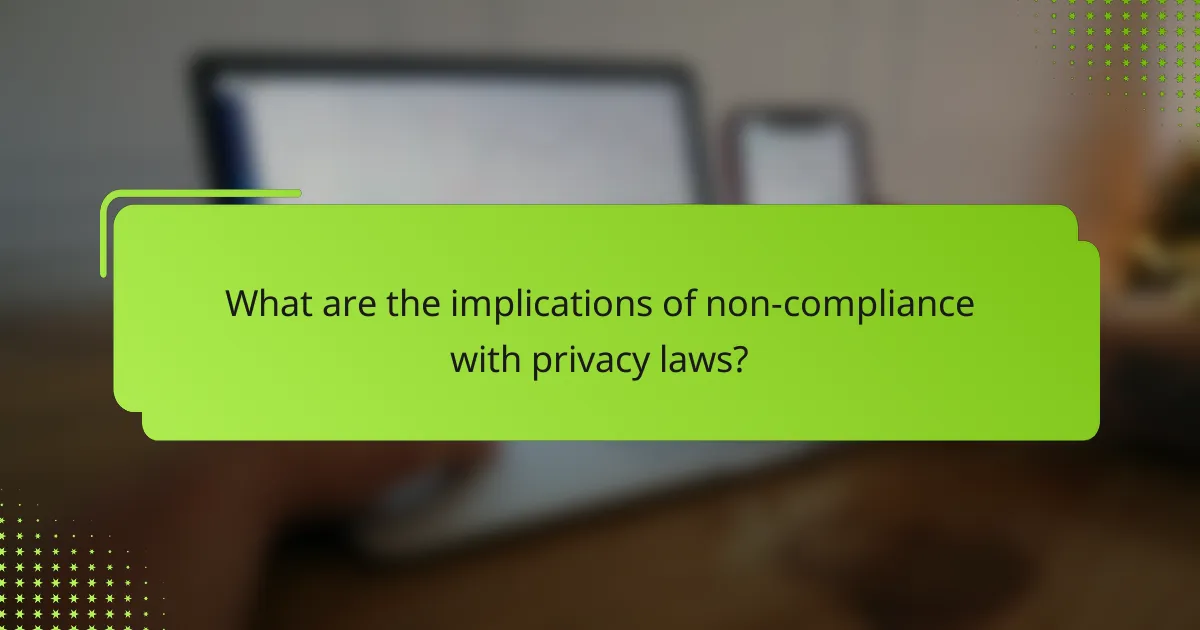
What are the implications of non-compliance with privacy laws?
Non-compliance with privacy laws can lead to severe consequences for organizations, including financial penalties, reputational harm, and legal repercussions. Understanding these implications is crucial for businesses to maintain compliance and protect their interests.
Financial penalties and fines
Organizations that fail to comply with privacy regulations may face significant financial penalties. These fines can range from thousands to millions of dollars, depending on the severity of the violation and the specific laws applicable in the jurisdiction.
For instance, under the General Data Protection Regulation (GDPR) in the European Union, fines can reach up to 4% of a company’s annual global turnover or €20 million, whichever is higher. Businesses should regularly assess their compliance status to avoid such costly repercussions.
Reputational damage
Non-compliance can severely damage an organization’s reputation. Customers and clients are increasingly concerned about how their data is handled, and any breach of trust can lead to loss of business and customer loyalty.
Negative publicity resulting from privacy violations can have long-lasting effects, making it essential for companies to prioritize compliance. Building a strong privacy framework not only helps avoid penalties but also enhances brand credibility.
Legal consequences
Legal consequences of non-compliance can include lawsuits from affected individuals or regulatory bodies. Organizations may face class-action suits if they fail to protect personal data, leading to costly legal battles and settlements.
In addition to civil lawsuits, companies may also encounter criminal charges in severe cases of negligence. It is vital for businesses to implement robust data protection measures and stay informed about evolving privacy laws to mitigate these risks.
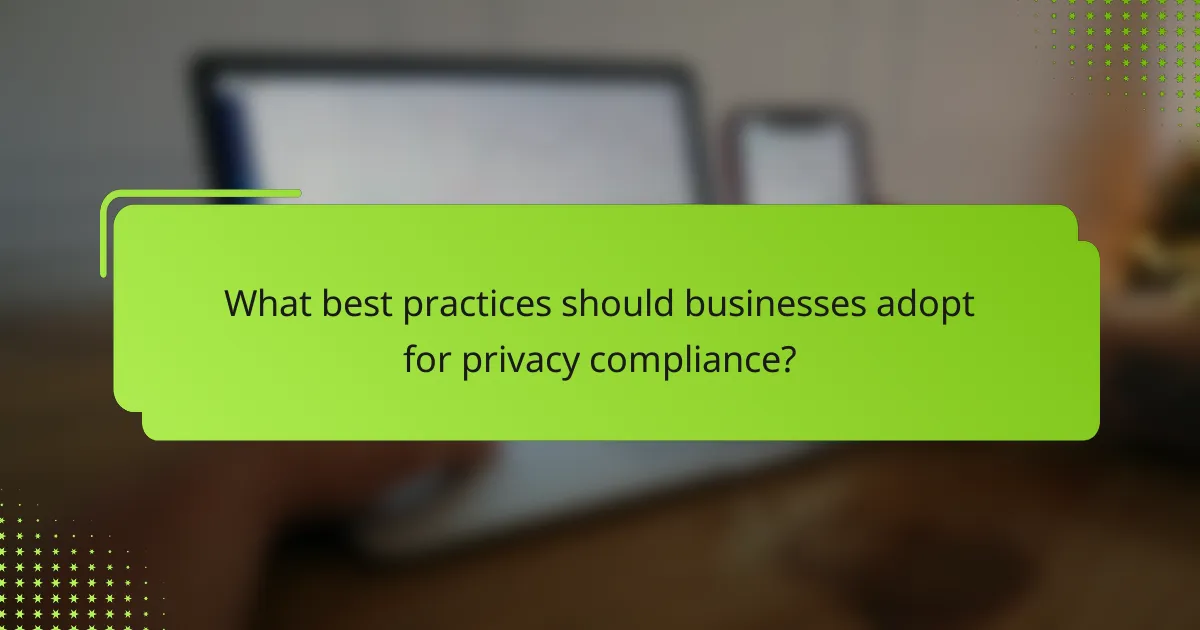
What best practices should businesses adopt for privacy compliance?
Businesses should adopt a range of best practices to ensure privacy compliance, focusing on minimizing data collection, training employees, and ensuring transparent user consent. These strategies not only help meet legal requirements but also build trust with customers.
Data minimization strategies
Data minimization involves collecting only the information necessary for a specific purpose. Businesses should regularly assess their data collection practices and eliminate any unnecessary data points to reduce risk and comply with regulations like GDPR.
For example, if a company only needs an email address for a newsletter, it should avoid asking for additional personal details. This approach not only simplifies compliance but also enhances user trust.
Regular employee training programs
Implementing regular employee training programs is crucial for maintaining privacy compliance. Employees should be educated on data protection laws, company policies, and the importance of safeguarding personal information.
Training sessions can include practical scenarios, role-playing, and updates on new regulations. Regular refreshers help ensure that all staff members remain vigilant and informed about their responsibilities regarding data privacy.
Transparent user consent processes
Transparent user consent processes are essential for building trust and ensuring compliance with privacy laws. Businesses should clearly explain what data is being collected, how it will be used, and obtain explicit consent from users before processing their information.
For instance, using clear language in privacy notices and providing easy-to-understand options for users to opt-in or opt-out of data collection can significantly enhance transparency. This approach not only meets legal standards but also fosters a positive relationship with customers.
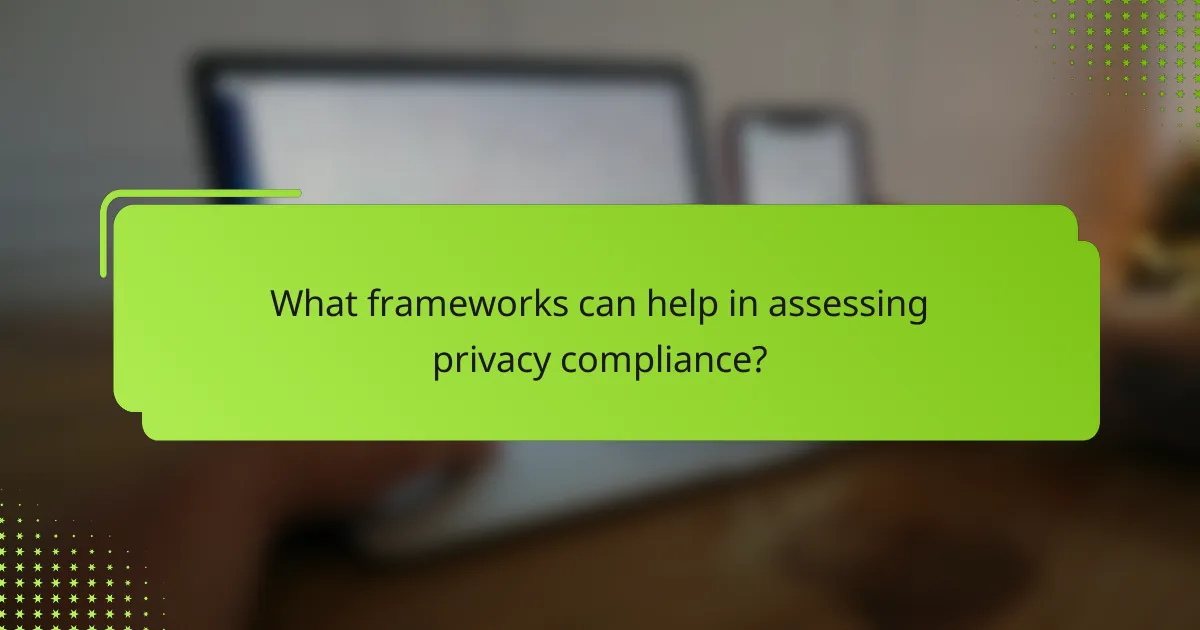
What frameworks can help in assessing privacy compliance?
Several frameworks can assist organizations in evaluating their privacy compliance, including the NIST Privacy Framework and the ISO/IEC 27701 Standard. These frameworks provide structured approaches to identify, assess, and mitigate privacy risks while ensuring adherence to applicable regulations.
NIST Privacy Framework
The NIST Privacy Framework is a voluntary tool designed to help organizations manage privacy risks. It consists of three main components: the Core, Profiles, and Implementation Tiers, which guide organizations in identifying and addressing privacy challenges.
Organizations can start by mapping their current privacy practices to the Framework’s Core functions: Identify, Govern, Control, Communicate, and Protect. This mapping helps in recognizing gaps and areas for improvement. For example, a company may discover that it lacks adequate data governance policies, prompting them to develop and implement stronger controls.
To effectively use the NIST Privacy Framework, organizations should regularly review and update their privacy practices, ensuring alignment with evolving regulations and stakeholder expectations. Engaging with stakeholders, including customers and employees, can provide valuable insights into privacy concerns.
ISO/IEC 27701 Standard
The ISO/IEC 27701 Standard extends the ISO/IEC 27001 and ISO/IEC 27002 standards to include privacy information management. It provides a framework for establishing, implementing, maintaining, and continually improving a Privacy Information Management System (PIMS).
Organizations adopting this standard can benefit from a structured approach to privacy compliance, including risk assessment and management, which helps in identifying potential privacy risks and implementing appropriate controls. For instance, a business might use the standard to ensure that personal data is processed in accordance with GDPR requirements.
To achieve compliance with ISO/IEC 27701, organizations should conduct regular audits and assessments of their PIMS, ensuring that it remains effective and aligned with legal obligations. This proactive approach not only minimizes risks but also enhances trust with customers and partners.
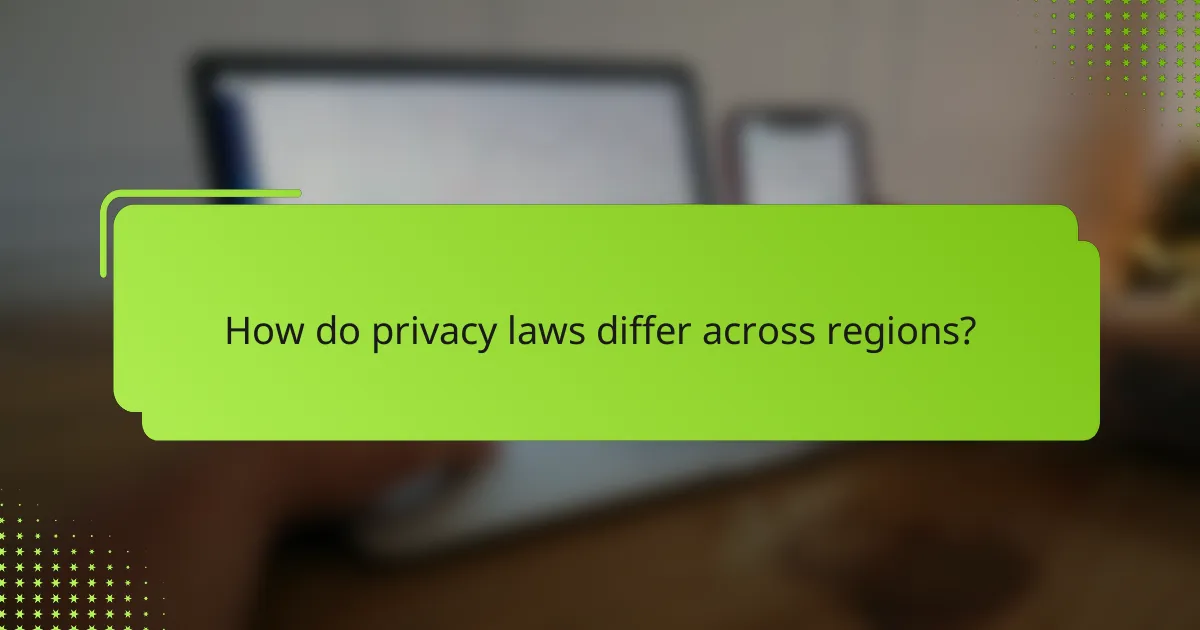
How do privacy laws differ across regions?
Privacy laws vary significantly across regions, reflecting different cultural attitudes towards data protection and individual rights. Key differences often involve the scope of regulations, enforcement mechanisms, and penalties for non-compliance.
Comparison of US and EU regulations
The United States and the European Union have contrasting approaches to privacy regulations. The EU’s General Data Protection Regulation (GDPR) emphasizes individual rights and data protection, applying strict rules on data processing and requiring explicit consent. In contrast, US regulations are more sector-specific, with laws like the California Consumer Privacy Act (CCPA) focusing on consumer rights but lacking a comprehensive federal framework.
In the EU, organizations face significant fines for non-compliance, often reaching up to 4% of global annual revenue or €20 million, whichever is higher. The US, however, typically imposes lower penalties, which can vary widely based on the specific law and state involved.
Businesses operating internationally must navigate these differences carefully. For example, a company collecting data from EU citizens must comply with GDPR, even if it is based in the US. Understanding these regulations is crucial for avoiding legal pitfalls and ensuring consumer trust.
